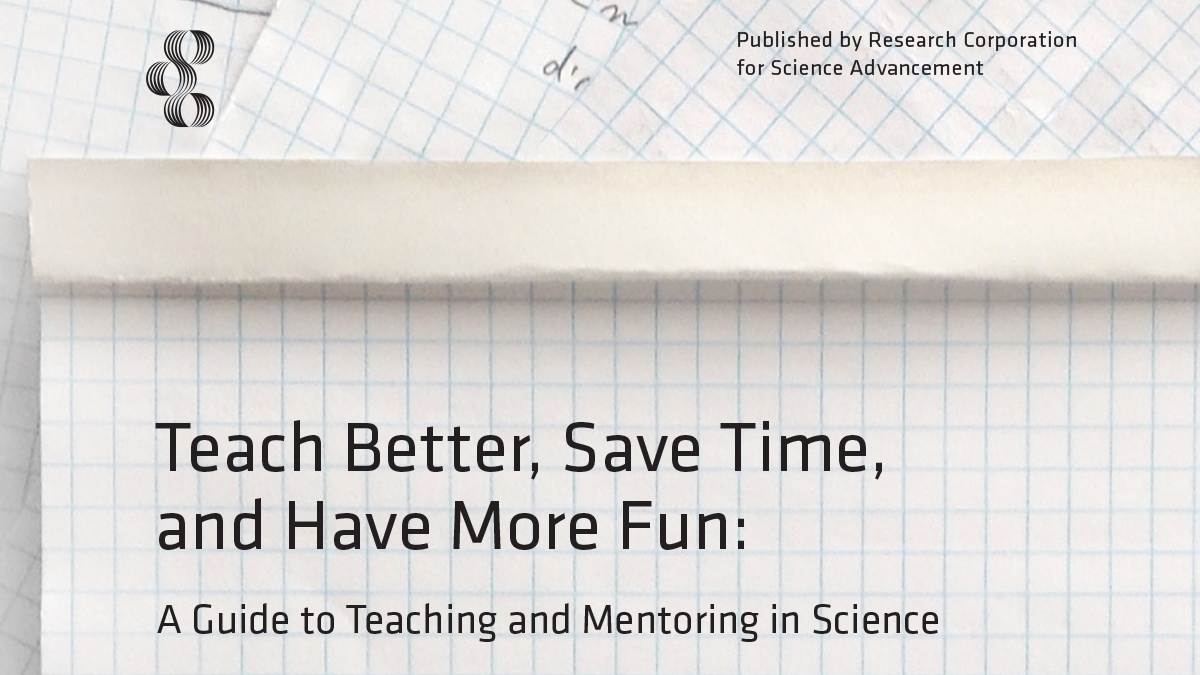2nd Edition of ‘Teach Better’ Extends Coverage to Online, Inclusive Teaching

Cottrell Scholars who authored Teach Better, Save Time, and Have More Fun: A Guide to Teaching and Mentoring in Science in 2014 to help early career faculty become effective educators without “reinventing the wheel” have published an expanded second edition with a particular focus on effective online and hybrid teaching, student and faculty mentoring, graduate student support, and inclusive teaching and mentoring.
The new edition is authored by Cottrell Scholar 2009 Penny J. Beuning, Northeastern University; CS 1996 Dave Z. Besson, University of Kansas; CS 2009 Scott A. Snyder, University of Chicago: and CS 2003 Nicola L.B. Pohl, Indiana University Bloomington. It has an annotated bibliography by Ingrid DeVries Salgado and Amy Blondin Hotchkiss, Northeastern University.
“The fundamentals of effective teaching and learning remain what they always have been: seeking the best opportunities and structures to help students engage deeply with material,” the authors said. “Nevertheless, the pandemic forced all educators to consider more intentionally how to accomplish effective education without everyone being in the same room, leading to a much larger conversation about what works broadly and what education should look like now that in-person classroom instruction has largely returned.”
The authors also said the new edition reflects the “social unrest, the #MeToo movement, and other critically important and broader cultural issues that have motivated many faculty to think more intensely about inclusive teaching and to provide broader supports for themselves and their students.”
The 216-page book, published by Research Corporation for Science Advancement, is available for download on RCSA’s website.
Teach Better is based on the collective wisdom of Cottrell Scholars and current education research.
For the first edition, the authors asked 241 Cottrell Scholars to think back to their earliest teaching experiences as faculty members and the advice they wish they had received as they started their careers. These reflections, plus input from science education experts and other faculty, as well as ideas gathered at the annual Cottrell Scholar Conferences, formed the basis of the book. Its chapters cover course development, best practices for leading large lectures, how to work with students at all levels, and the latest research in scientific pedagogy.
For the second edition, the authors again surveyed Cottrell Scholars about their experiences with active learning, mentoring, and the transition to online, virtual teaching necessitated by the COVID-19 pandemic. They collected 46 responses, including personal vignettes and experiences that help give the book its conversational tone.
A series of virtual Cottrell Scholar Conversations, hosted by RCSA in 2020 to engage the community in addressing challenges to teaching and research brought on by the pandemic, also contributed critical themes for the book.
“The basic goal of the book remains providing support for faculty to implement effective practices in their teaching and mentoring,” said Beuning. “Given the greater emphasis on inclusive education and support for students and faculty, these sections have been expanded, including a greatly expanded annotated bibliography, especially on these topics.”
The first edition of the book has been distributed and discussed at the RCSA/American Chemical Society New Faculty Workshops, at faculty orientation events at a variety of institutions, and in trainings for teaching assistants.
“This book comes straight from the heart of the Cottrell Scholar community and shows their commitment to excellence in both teaching and research,” said RCSA Senior Program Director Silvia Ronco. “It is a gift to early career faculty who are learning to balance their research activities with effective teaching and mentoring, whether they are at small colleges or major research universities.”
Over the years, Teach Better has become a useful guide not just for junior faculty starting their careers but for more experienced faculty who want to stay abreast of the latest trends and best practices.
“The book feels like a conversation with friends, or like participating in the best sort of teaching circle with supportive colleagues,” said Erin Cram, Associate Dean for Research, College of Science, Northeastern University, who is quoted on the book’s cover. “Even though I have been teaching for many years, I learned a few things and have some new ideas I am excited to try out. The quotes are real gems, filled with excellent advice I wish I had received when I was an assistant professor.”





